Walnut shells make powerful soap scrubs due to their natural hardness (4-5 MOHS), which effectively removes dead skin cells without causing irritation. You'll benefit from improved circulation and smoother skin texture as these biodegradable exfoliants unclog pores while maintaining your skin's moisture balance. Unlike plastic microbeads, they're environmentally sustainable, being repurposed from agricultural waste. The perfect balance between gentle and effective exfoliation awaits as you discover nature's ideal scrubbing ingredient.
The Natural Exfoliation Process of Walnut Shells

While many commercial exfoliants rely on synthetic materials, walnut shells offer a naturally effective alternative for skin renewal. Their inherent coarseness makes them ideal for mechanical exfoliation, gently removing dead skin cells to reveal fresher skin underneath.
Nature's own exfoliation solution—walnut shells remove dead cells while synthetic options fade into obsolescence.
When ground into powder, walnut shells become versatile exfoliants that you'll find in various skincare formulations. The rich antioxidant profile helps protect your skin from environmental damage while exfoliating. The quality of grinding greatly impacts their performance—finer particles reduce irritation risk while maintaining effectiveness. For facial applications, you'll want the finest grade to avoid micro-tears in your delicate skin.
What makes these shells particularly appealing is their eco-friendly profile. Unlike plastic microbeads, they're completely biodegradable and non-toxic.
You're not just caring for your skin but also making an environmentally conscious choice that's gentle on both your wallet and the planet.
Skin Benefits of Walnut Shell Exfoliation
You'll notice your skin's texture transform with regular walnut shell exfoliation, as it gently buffs away dead cells to reveal a smoother, more radiant complexion.
The natural abrasive quality of walnut shells effectively addresses uneven texture issues without irritating sensitive skin types.
This gentle yet thorough exfoliation process stimulates circulation, creating a natural healthy glow that enhances your skin's overall appearance.
Walnut shell powder helps to dislodge impurities that become trapped in your pores, leaving your skin noticeably cleaner and fresher.
Smoother, Radiant Complexion
When dullness dims your natural glow, walnut shell exfoliation offers a powerful solution for revealing radiant skin. These natural granules efficiently remove dead skin cells that accumulate and create a lackluster appearance. With regular use, you'll notice a significant improvement in your skin's texture and tone. Modern cosmetic companies now use finely ground powder to ensure gentle yet effective exfoliation.
| Benefit | How It Works |
|---|---|
| Enhanced Radiance | Removes surface dullness |
| Even Skin Tone | Refines texture and reduces spots |
| Better Product Absorption | Clears pathway for skincare ingredients |
| Increased Circulation | Stimulates blood flow to skin surface |
Unlike synthetic alternatives, walnut shells provide these benefits while being environmentally friendly. They're biodegradable and sustainable, giving you guilt-free exfoliation. You'll also appreciate how they maintain your skin's natural moisture balance while delivering essential nutrients and antioxidants that protect against environmental damage.
Addresses Texture Issues
Rough, uneven skin texture remains one of the most common complaints among skincare enthusiasts. Walnut shell exfoliants offer a powerful solution by efficiently removing dead skin cells that cause this uneven appearance. When you incorporate this natural scrub into your routine, you'll notice how it stabilizes your skin's texture over time.
The finely ground shells work to gently alleviate dry, flaky patches without irritating your skin. The non-soluble nature of walnut shells makes them particularly effective at removing blemished skin without dissolving prematurely. As you exfoliate, you're also stimulating blood circulation, which promotes cell renewal and rejuvenation.
This process helps refine your skin's surface while preparing it to better absorb your moisturizers and serums. You'll find that walnut shell scrubs are particularly effective at addressing texture irregularities while simultaneously reducing red spots and improving your skin's overall quality.
Selecting and Preparing Walnut Shells for Soap Making

The journey to creating an effective walnut shell soap scrub begins with proper selection of materials. You'll want to source high-quality walnut shells, which offer a perfect balance of durability with a 4-5 MOHS hardness rating that exfoliates effectively without damaging skin.
When preparing shells, make certain they're properly ground to your desired consistency. Choose between fine particles for facial products or medium grains for body scrubs. The grinding process creates uniform particles that distribute evenly throughout your soap.
Store your ground shells in a cool, dry place to prevent moisture absorption.
What makes walnut shells particularly valuable is their non-toxic, biodegradable nature and chemical stability with other soap ingredients. For optimal scrubbing performance in mechanic soaps, consider using approximately 8 tablespoons of walnut shells for adequately exfoliating properties. They're more cost-effective than synthetic alternatives while providing the natural appeal many consumers seek.
Incorporating Walnut Shells Into Cold Process Soap Formulations
Cold process soap making presents an ideal method for incorporating walnut shells into exfoliating products.
You'll want to add the ground shells toward the end of your soap-making process to prevent settling and guarantee even distribution throughout your batch.
The amount you use depends on your desired exfoliation level—typically ranging from a few tablespoons to larger quantities for more aggressive scrubbing.
Whisk thoroughly to distribute the shells evenly throughout your soap mixture.
Consider using deeper colors in your soap to mask the grayish hue of walnut shells.
After pouring your soap, it'll require the standard 4-6 week curing time to harden properly.
The shells remain chemically stable in your formulation, without reacting with other ingredients, making them versatile for various soap recipes.
For layered designs, you can pour about three-quarters of the walnut shell mixture into the bottom of the mold before adding your colored soap layers.
Environmental Advantages of Walnut Shell Exfoliants

When you choose walnut shell scrubs, you're selecting a fully biodegradable alternative to plastic microbeads that won't pollute waterways or harm marine life.
Your sustainable choice supports a renewable resource chain that utilizes what would otherwise be agricultural waste from walnut food production.
These eco-friendly exfoliants are chemically unprocessed and free from the 26 allergens listed in EU Cosmetic Regulation, making them safe for both consumers and the environment.
Biodegradable Plastic Alternative
Four notable environmental advantages make walnut shell exfoliants superior to traditional microplastics in skincare products.
Unlike petroleum-based scrubs, walnut shells biodegrade completely, leaving no persistent waste in water systems. They're sourced from food production byproducts, perfectly aligning with circular economy principles by repurposing what would otherwise be discarded. Pioneering Chilean startup Valnux demonstrates this approach by converting 12,000 tons of walnut shell waste into valuable materials.
You'll also appreciate how walnut shell production requires considerably less energy and generates fewer greenhouse gas emissions than conventional plastic manufacturing.
This renewable resource doesn't demand additional land or water resources to produce.
The innovation extends beyond skincare too—walnut shells are now being transformed into Nuxit, a versatile bioplastic material used in kitchen utensils, food packaging, and even children's toys, offering a sustainable alternative to traditional thermoplastics across multiple industries.
Zero Microplastic Pollution
The most critical environmental benefit of walnut shell exfoliants is their complete elimination of microplastic pollution in waterways. Unlike synthetic microbeads that persist indefinitely in oceans and lakes, walnut shells naturally biodegrade, leaving no harmful residue behind.
You're making a significant positive impact when you choose walnut shell scrubs. These non-toxic, renewable exfoliants provide effective skin buffing while protecting aquatic ecosystems. Walnut shells are sustainably produced in solar-run facilities that minimize environmental impact.
As microplastic bans increase worldwide, walnut shells represent the sustainable future of personal care products.
The environmental advantages extend beyond water conservation—walnut shell processing typically involves lower carbon emissions and more sustainable manufacturing practices.
Your conscious consumer choice supports green initiatives and helps reduce the microplastic crisis that threatens marine life and potentially human health.
Renewable Resource Chain
Beyond eliminating microplastics, walnut shells offer another environmental advantage through their fully sustainable supply chain.
When you choose walnut shell exfoliants, you're supporting an annually renewable resource that's harvested alongside walnuts without additional environmental strain.
Companies like Eco-Shell source these shells from local California farms, considerably reducing transportation impacts. This local sourcing creates a stable supply chain that minimizes formulation disruptions while decreasing dependence on non-biodegradable materials.
What happens after use matters too. Unlike synthetic alternatives, walnut shells biodegrade completely, enriching soil rather than polluting waterways. These all-natural and non-toxic ingredients provide peace of mind for environmentally conscious consumers.
Many walnut shell products even carry EcoCert certification, verifying their environmental compliance. By choosing walnut shell scrubs, you're participating in a circular economy that turns agricultural byproducts into valuable skincare ingredients.
Safety Considerations When Using Walnut Shells

While walnut shells provide excellent exfoliation properties, they come with significant safety considerations you'll need to address before incorporating them into your soap formulations.
If you have tree nut allergies, avoid walnut shell products entirely. They're not safe for eye areas and can cause serious irritation, though they work well for lip scrubs.
Start with conservative amounts—about 1 teaspoon per pound of soap—to prevent skin irritation from over-exfoliation. The vegan and palm-free formulation makes this natural exfoliant an excellent choice for environmentally conscious crafters. Always conduct patch tests before regular use, especially if you have sensitive skin.
Confirm your product labels clearly disclose walnut shell ingredients to protect allergic consumers. When formulating, distribute shells evenly throughout your soap for consistent exfoliation.
Proper processing is vital to eliminate sharp edges that could damage skin.
Comparing Walnut Shells to Other Natural Exfoliants
Natural exfoliants vary widely in effectiveness, sustainability, and skin benefits, making the choice between walnut shells and alternatives essential for your soap formulation success.
Selecting the right natural exfoliant can make or break your soap formula's performance, sustainability profile, and skin benefits.
While sugar offers gentle exfoliation with moisturizing properties and coffee grounds provide coarse texture ideal for cellulite reduction, walnut shells stand out for their balance of effectiveness without irritation.
- Superior Versatility – Unlike salt (too harsh for facial use) or oatmeal (limited abrasiveness), walnut shells work equally well in face scrubs, body lotions, and foot care.
- Environmental Champion – Walnut shells outperform sugar and salt in eco-friendliness as they're biodegradable, non-toxic, and require minimal processing.
- Cost-Effective Quality – You'll achieve premium exfoliation results with walnut shells while maintaining lower production costs than specialized alternatives. When formulating with walnut shell powder, you'll need to incorporate proper preservatives if your base contains water to prevent mold and ensure product safety.
Frequently Asked Questions
How Long Do Walnut Shell Soaps Maintain Their Exfoliating Properties?
Your walnut shell soaps maintain effective exfoliation throughout the soap's life if stored properly. They'll keep their scrubbing power for months or even years when kept dry and moisture-free between uses.
Can Walnut Shell Soap Be Used on Sensitive Skin Conditions?
You should use walnut shell soap cautiously on sensitive skin. Opt for finely ground shells, apply with gentle pressure, and patch test first. If you notice irritation, discontinue use immediately.
What Sustainability Certifications Should I Look for in Walnut Products?
Look for EcoCert, Halal, EU Cosmetic Regulation compliance, BSE/TSE-Free, Non-GMO, and Cruelty-Free certifications in walnut products. These guarantee sustainability, ethical practices, and safety standards are met for your purchases.
How Does Walnut Shell Soap Perform in Different Water Hardness Levels?
Walnut shell soap maintains its exfoliating performance regardless of water hardness. You'll notice consistent benefits, though hard water may reduce lathering slightly. The shells' physical scrubbing action works effectively in all water conditions.
Are There Specific Storage Requirements for Walnut Shell Soaps?
You don't need special storage conditions for walnut shell soaps. They're stable formulations that maintain freshness over time. Just keep them dry between uses like regular soap to prolong their effectiveness and appearance.
In Summary
You've discovered a powerful natural exfoliant in walnut shells! They'll gently remove dead skin while being environmentally friendly compared to plastic microbeads. When making your own walnut shell soap, make sure you're grinding shells to the proper size and testing for allergies first. Don't forget to take into account sustainability—walnut shells are biodegradable waste products that you're repurposing into something beneficial for both your skin and the planet.
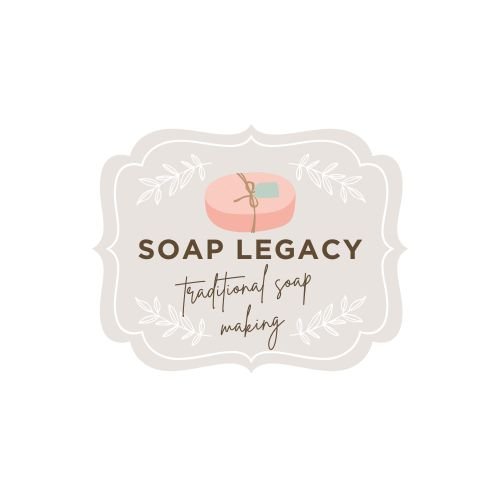
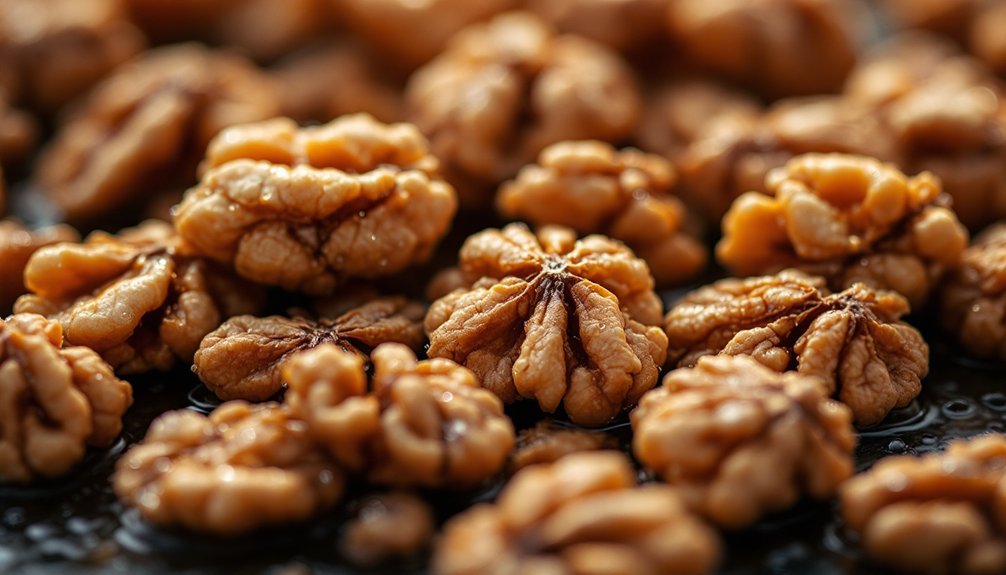
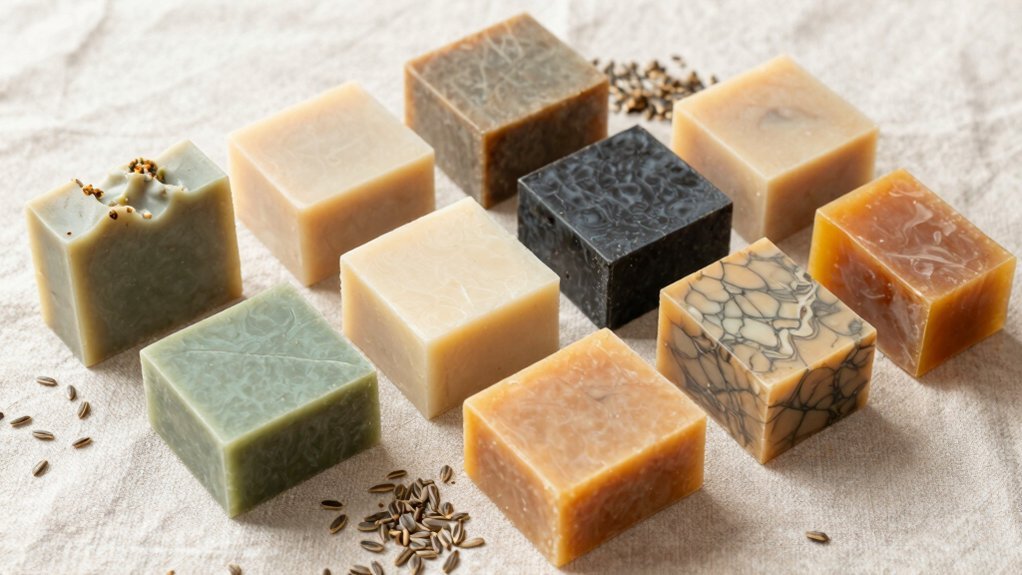
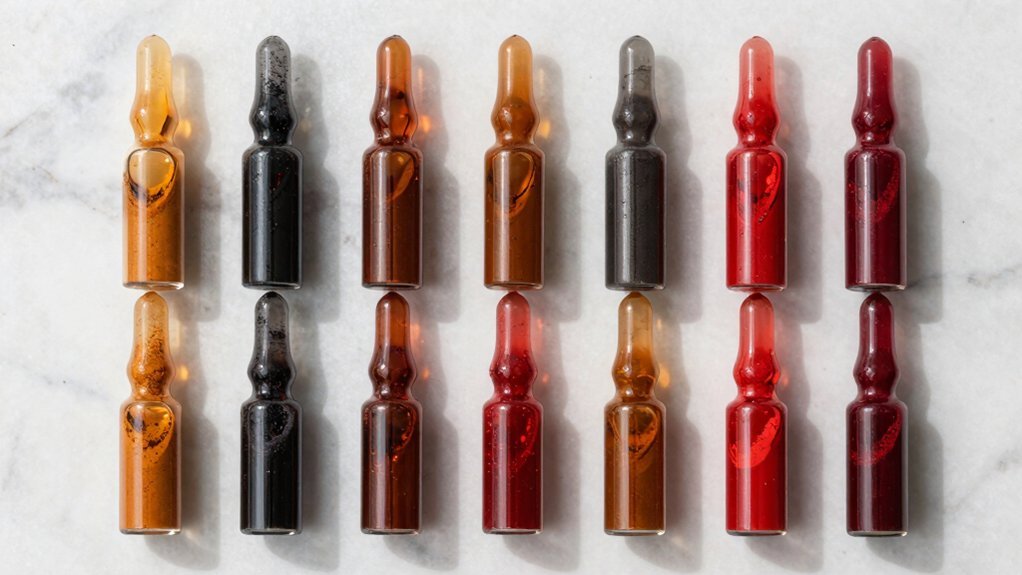
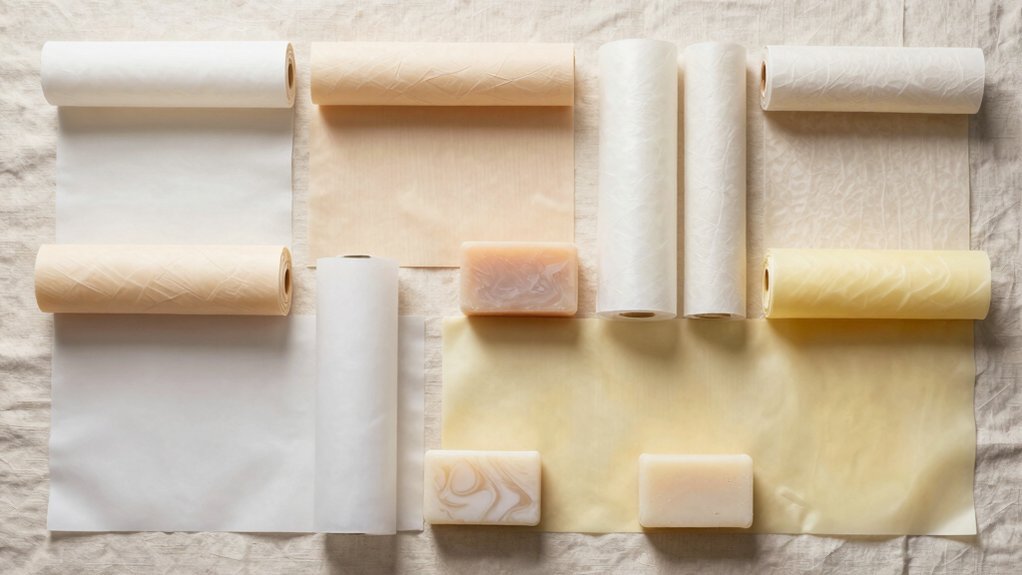
Leave a Reply